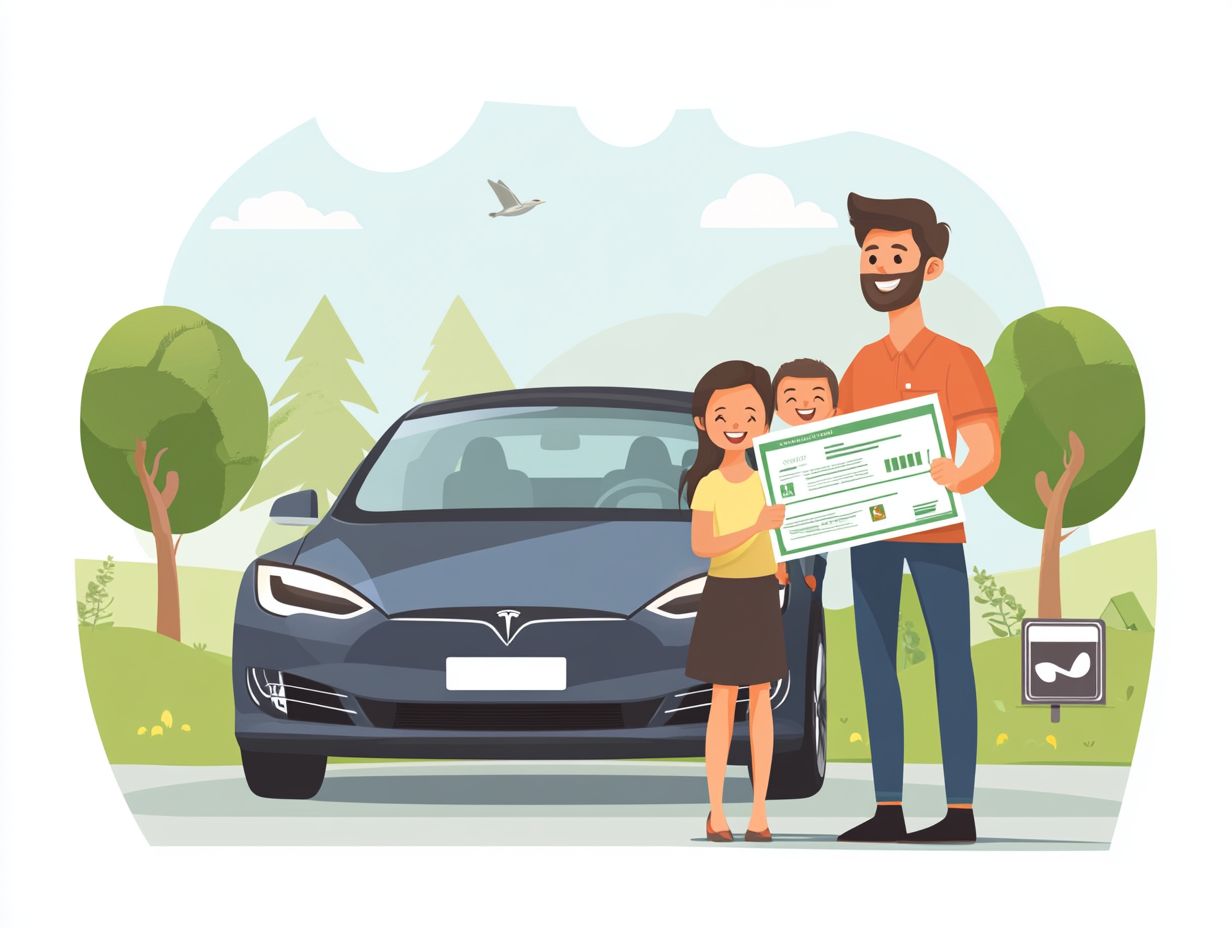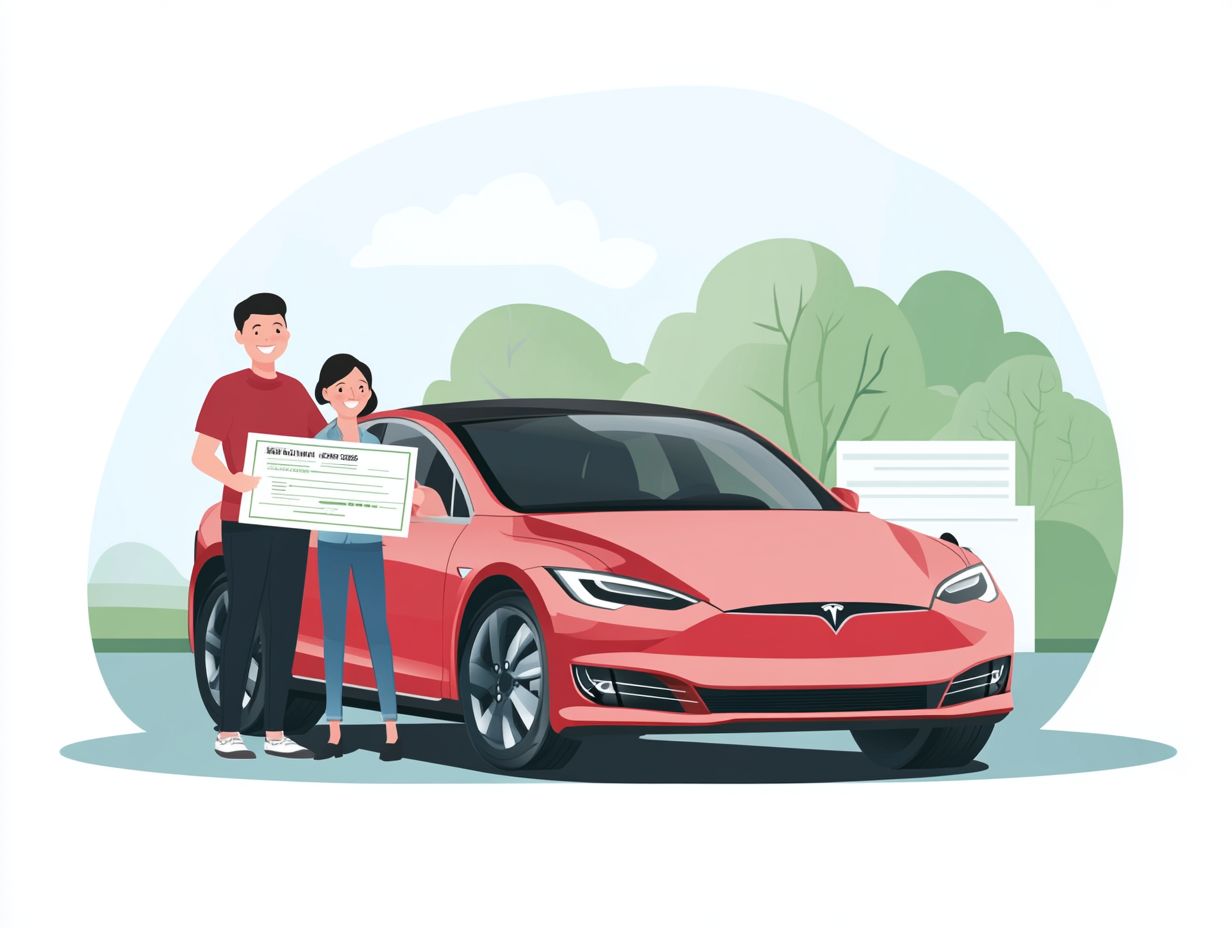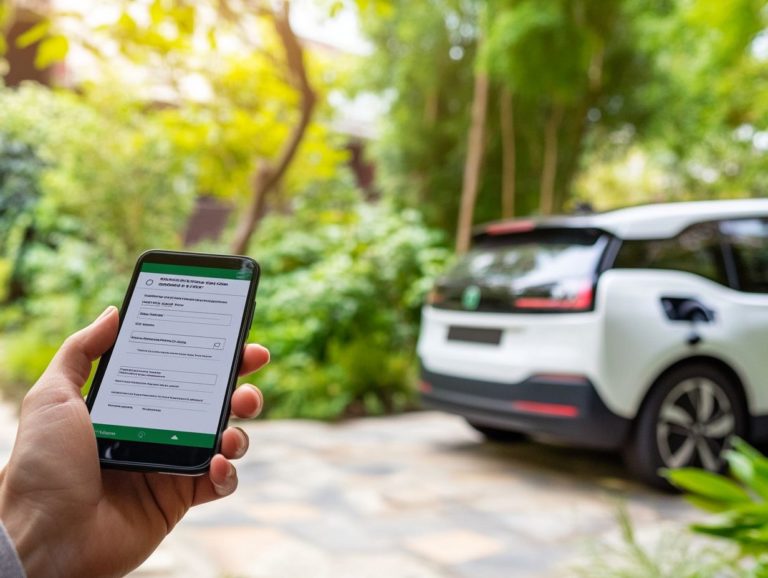tax benefits for electric vehicle buyers
Considering the switch to an electric vehicle (EV)? Beyond the undeniable environmental advantages, EVs offer a variety of financial incentives that can significantly enhance the value of your investment.
This article delves into federal tax credits available to you, outlining who qualifies and the process for claiming them. It also highlights state and local incentives that can amplify your benefits even further.
You will also discover more financial benefits of owning an EV, including substantial savings on fuel and impressive resale values. Discover the potential savings that await you!
Contents
- Key Takeaways:
- What are Tax Benefits?
- Federal Tax Credits for Electric Vehicles
- State and Local Incentives for Electric Vehicles
- Other Financial Benefits of Electric Vehicles
- Frequently Asked Questions
- What are the tax benefits for electric vehicle buyers?
- How much is the federal tax credit for electric vehicle buyers?
- Are there any state-specific tax benefits for electric vehicle buyers?
- Do electric vehicle buyers have to pay any taxes?
- What is the time frame for claiming tax benefits for electric vehicle buyers?
- Do tax benefits for electric vehicle buyers ever expire?
Key Takeaways:

- Federal tax credits for electric vehicles can significantly reduce the cost of purchasing an EV, making it a more affordable and environmentally friendly option.
- State and local incentives, such as rebates and tax exemptions, can further reduce the cost of buying an electric vehicle and vary depending on your location.
- In addition to tax benefits, electric vehicle owners can save on fuel and maintenance costs and potentially reap higher resale values, making it a financially smart choice in the long run.
What are Tax Benefits?
Tax benefits encompass various forms of financial relief offered by government entities to encourage specific behaviors or investments that promote sustainability and environmental responsibility.
There has been a strong emphasis on tax credits for clean vehicles, especially electric vehicles (EVs), driven by impactful legislative measures such as the Inflation Reduction Act.
The act and IRS guidelines explain what you need to qualify for tax credits. These benefits are available to everyone and contribute to a more environmentally conscious landscape across North America.
Federal Tax Credits for Electric Vehicles
Federal tax credits for electric vehicles (EVs) serve as vital financial incentives designed to accelerate your adoption of clean vehicles nationwide. To learn more about the various incentives available for EV buyers, check out the details that have made a noteworthy impact in the thriving electric vehicle market.
These credits can significantly decrease the cost of purchasing an EV for you. Up-front credits are available for both new and used vehicles. This means more EV options for you, making it easier to choose a sustainable vehicle!
Eligibility Requirements
Eligibility for federal tax credits related to electric vehicles (EVs) is clearly outlined by IRS guidelines, ensuring you understand the parameters necessary to qualify for these incentives.
These criteria cover various aspects, including the specific classification of your vehicle whether it’s a battery electric vehicle (BEV) or a plug-in hybrid electric vehicle (PHEV). It’s essential for you to examine the Vehicle Identification Number (VIN), as this unique number plays a crucial role in confirming your vehicle s eligibility under IRS regulations.
Obtaining a comprehensive vehicle history report can provide valuable insights into the car’s previous ownership and its compliance with necessary environmental standards. When you purchase from registered dealers, you not only ensure adherence to these guidelines but also gain protection and peace of mind, knowing that your vehicle meets all the eligibility requirements for claiming federal tax credits effectively.
Act now to maximize your savings on an electric vehicle!
How to Claim the Credit

To claim the federal tax credit for electric vehicles (EVs), follow the IRS guidelines. These guidelines outline the necessary documentation and filing procedures.
This process involves using specific forms and ensuring you meet all eligibility criteria for a successful claim.
Navigating this process may seem daunting at first, especially for first-time claimants who are unfamiliar with the intricacies involved. Begin by verifying your EV’s eligibility; not all electric vehicles qualify for the full credit amount.
You ll need to complete IRS Form 8834 next. This form is used to claim the credit for qualified electric vehicles and should be submitted alongside your annual tax return.
It’s crucial to keep track of your purchase receipt and the manufacturer s certification letter. These documents serve as proof of eligibility.
Common pitfalls often arise during the documentation phase. Vital paperwork may be overlooked, resulting in processing delays or denied claims.
By staying organized and proactive in gathering the necessary documents, you can ensure a smoother claim experience.
State and Local Incentives for Electric Vehicles
State and local incentives for electric vehicles (EVs) significantly enhance the allure of transitioning to clean vehicles. These incentives often work hand-in-hand with federal tax credits, creating a robust support system for consumers.
They can take the form of various financial benefits, such as rebates and grants for charging infrastructure, all designed to encourage the adoption of EVs within your community.
Overview of Different Incentives
An overview of the various incentives available for electric vehicles (EVs) reveals a rich tapestry of support options. These range from state-level rebates to local grants designed to enhance the infrastructure for clean vehicles.
Incentives can significantly alleviate the financial burden as you consider making the shift toward electric mobility. With incentives varying from state to state, you have a wealth of choices tailored to your specific needs.
For example, some states might offer substantial tax credits, while others could provide reduced registration fees or even access to carpool lanes.
Local municipalities may introduce distinctive programs, such as free charging stations or city-sponsored discounts for residents who purchase EVs. This financial backing encourages you to make the switch and aligns with broader environmental goals.
By helping to reduce emissions, these incentives are crucial for stimulating electric vehicle adoption across different regions, making your transition to EVs not just feasible but also beneficial on multiple levels.
How to Find Incentives in Your Area
Discovering EV incentives in your area is easier than you think! Utilizing resources such as state government websites and local EV advocacy groups can lead you to comprehensive lists of available incentives.
This ensures you re well-informed about the financial benefits available to you as a prospective EV buyer. Several online platforms act as invaluable hubs for this information, making it easy for you to navigate through various incentives specific to your region.
Websites like the U.S. Department of Energy’s Alternative Fuels Data Center provide detailed maps and databases that showcase federal, state, and local incentives. Organizations like Plug In America and the Electric Drive Transportation Association frequently update their resources, giving you access to the latest funding opportunities.
By leveraging these tools, you can make informed decisions and maximize your savings when investing in electric vehicles. Act now to take full advantage of these savings and incentives!
Other Financial Benefits of Electric Vehicles

The financial advantages of electric vehicles (EVs) go well beyond federal tax credits and incentives. You ll find substantial savings on both fuel and maintenance costs, making them an enticing choice for discerning consumers.
As fuel prices continue to climb and maintenance needs decrease thanks to fewer moving parts the shift to an EV can offer remarkable long-term financial benefits.
Savings on Fuel and Maintenance Costs
Imagine saving up to $1,200 a year just by switching to an EV! It s not just about being eco-friendly; it s about keeping more money in your pocket.
Savings on fuel and maintenance costs represent a significant advantage of electric vehicles (EVs) that many drivers find appealing. Many drivers discover that their operational costs are notably lower compared to traditional gasoline-powered vehicles.
In today s EV market, the cost of charging often outshines the unpredictable prices of gasoline. Maintenance needs are reduced due to simpler mechanics and fewer moving parts.
Studies indicate that EV owners can save between $800 and $1,200 annually just on fuel. Electric motors demand much less upkeep than traditional gas engines, leading to fewer visits to the mechanic and lower repair bills.
Many users report minimal maintenance expenses, as components like oil filters and exhaust systems are virtually nonexistent. Numerous drivers share testimonials about slashing their overall annual costs by nearly 50%.
Transitioning to an EV aligns with sustainability goals and enhances your economic viability. Explore your options today!
Resale Value of Electric Vehicles
The resale value of electric vehicles (EVs) is a key factor to consider as you explore your options in the evolving market landscape. With shifting consumer perceptions and increasing demand for clean vehicles, many EVs are experiencing a promising resale value.
Factors such as brand reputation, battery life, and current market conditions play a pivotal role in determining the resale price of these vehicles. Recent advancements in technology, like improved charging infrastructure and longer-lasting batteries, make EVs even more appealing in the secondary market.
As you recognize the cost savings tied to electric driving think lower maintenance and fuel expenses the allure of owning an EV only grows stronger.
Government incentives and environmental policies encourage broader adoption, creating a more competitive resale landscape. This dynamic interplay of consumer sentiment, technological progress, and external economic factors shapes the resale market for electric vehicles, making it an intriguing area to keep an eye on.
Frequently Asked Questions
What are the tax benefits for electric vehicle buyers?

Tax benefits for electric vehicle buyers include federal tax credits, state tax credits, and understanding the tax benefits for EV owners, as well as lower vehicle registration fees.
How much is the federal tax credit for electric vehicle buyers?
The federal tax credit for electric vehicle buyers can range from $2,500 to $7,500, depending on the battery capacity and vehicle’s cost, making it crucial to explore understanding tax deductions for EV purchases.
Are there any state-specific tax benefits for electric vehicle buyers?
Yes, many states offer additional tax incentives for electric vehicle buyers, such as rebates, tax exemptions, and carpool lane access.
Do electric vehicle buyers have to pay any taxes?
Yes, electric vehicle buyers still have to pay taxes like any other vehicle owner, such as sales tax and property tax. However, they may be eligible for tax deductions and credits.
What is the time frame for claiming tax benefits for electric vehicle buyers?
The time frame for claiming tax benefits for electric vehicle buyers varies depending on the specific tax credit. For federal tax credits, it must be claimed in the same tax year the vehicle was purchased, so it’s important to stay informed about understanding electric vehicle tax incentives.
Do tax benefits for electric vehicle buyers ever expire?
Yes, tax benefits for electric vehicle buyers may expire. Federal tax credits for specific vehicle models have a limit of 200,000 vehicles sold per manufacturer, after which the credit starts to phase out. For more details on this topic, check out the benefits of EV tax credits explained. State tax incentives may also have expiration dates or funding limitations.






